Autophagy and Proteostasis
Ivan Dikic
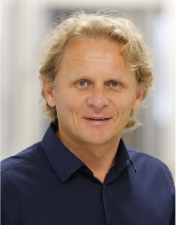
The main research interest in Ivan’s lab is the ubiquitin system. Using highly interdisciplinary approaches, his team investigates how ubiquitin can influence complex processes such as inflammation, DNA repair, selective autophagy and proteasomal degradation. Ivan received his MD in 1991 from the University in Zagreb. He performed his PhD at the University of Zagreb and the New York University School of Medicine where he continued to work as postdoctoral scientist. In 1997 he established his own research group at the Ludwig Institute for Cancer Research in Uppsala. In 2002 he was appointed as a Professor at Goethe University Frankfurt. Since 2009 he is Director of the Institute of Biochemistry II and from 2009 to 2013 he was scientific director of the Buchmann Institute for Molecular Life Sciences. He received numerous awards and is member of several academic societies.
Thorsten Hoppe
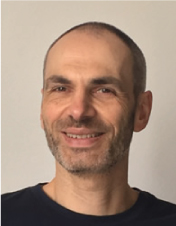
Thorsten obtained his PhD in Biology, University of Heidelberg, supervised by Stefan Jentsch. He pursued his postdoctoral studies in the lab of Ralf Baumeister in Munich. His main goal is to understand the role of key proteolytic pathways in the context of aging-associated processes. Taking advantage of fluorescent reporter proteins, he was able to visualize the activity of the proteasome and autophagy degradation machinery in transgenic C. elegans. Indeed, the manipulation of the degradation machinery, allowed to delay the aging process in C. elegans and provided relevant findings for future therapeutic targets against degenerative aging-associated diseases, including Alzheimer’s and Parkinson’s disease.
Brenda Schulman
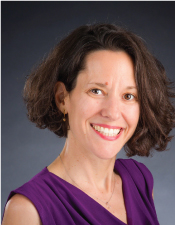
Brenda is the Director at the Max Planck Institute of Biochemistry. She obtained her PhD in Biology, in the lab of Peter S. Kim at the MIT. Then she pursued her postdoc with Ed Harlow at the Massachusetts General Hospital Cancer Center and later with Nikola Pavletich at the Memorial Sloan Kettering Cancer Center. She has substantially contributed in the characterization of ubiquitin-like proteins (UBLs), a class of proteins that are similar to ubiquitin. Her main interested is how ubiquitin and ubiquitin-like proteins are able to specifically modify certain substrates, and how they alter the functions of their targets to regulate biological processes. Brenda is an elected member of American Academy of Arts and Sciences, the National Academy of Sciences and EMBO. She has been awarded of several prizes including the Gottfried Wilhelm Leibniz Prize and Ernst Jung Prize for Medicine.
Peter Tompa
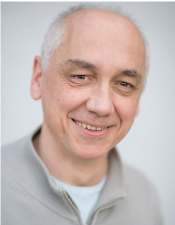
Peter pursued his PhD in biochemistry and enzymology from the ELTE University, Budapest. He is currently the director of the VIB department of Structural Biology, in Brussels, and professor of biochemistry at the VUB (Free University Brussels). Moreover, he is professor of biochemistry and protein sciences in the Institute of Enzymology in Budapest. He has research groups both in Brussels and Budapest. His research focuses on intrinsically disordered proteins (IDPs). He played a key role in the rise of this field, publishing more than 50 papers related to structural disorder. His work suggested a functional classification of IDPs, providing an actual role of structural disorder in chaperone function, introducing a basic concept of unusual modes of action of IDPs. He was part of the organization of the first conference of the IDP field, the EMBO workshop “Intrinsically unfolded proteins: from structure to function” held in Budapest in 2007.
Signalling in Health and Disease
Chiara Ambrogio
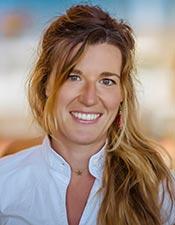
Chiara’s research focus is the “KRAS signalosome”: the protein complex engaging KRAS and its modulators at the cell membrane. Her research group uses both in vivo and in vitro approaches to better understand KRAS regulation, which is fundamental in the development of new therapies for KRAS-mutant cancer. Chiara studied Medical Biotechnology at the University of Turin and obtained her PhD under the supervision of Roberto Chiarle. As a post-doc she joined Mariano Barbacid’s group where she studied signaling in RAS-driven tumors. From 2016 to 2019 she worked as Senior Scientist at the Dana Farber Cancer Institute with Pasi Jänne, investigating KRAS signaling pathway in both normal and pathophysiological states. In 2018 she received the prestigious “Armenise-Harvard Career Development Award”, which allowed her to establish her own research lab.
Dario Alessi
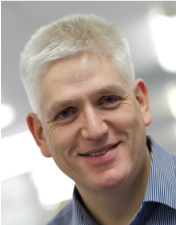
Dario’s research focuses on poorly characterised components regulating protein phosphorylation or ubiquitylation pathways, which could be linked to human diseases. Dario obtained a BSc (1988) and PhD (1991) from the University of Birmingham, United Kingdom. He carried out postdoctoral research at the University of Dundee from (1991 to 1997), where he became fascinated by protein kinases and how they are regulated by insulin, growth factors and other extracellular signals. In 1997 Dario became a program leader in the MRC Protein Phosphorylation Unit, and since 2012 he is the Unit director. Dario also serves as the Director of the Dundee Signal Transduction Therapy Unit: a unique collaboration between scientists at the University of Dundee and pharmaceutical companies, dedicated to accelerating the development of specific inhibitors and chemical probes that target the protein phosphorylation and ubiquitylation system. His team has contributed to our understanding of several disease relevant signal transduction pathways including PDK1 (diabetes and cancer), LKB1 (cancer), WNKs (blood pressure). Much of Dario’s current work is focused on understanding LRRK2 and how mutations in this enzyme cause Parkinson’s disease.
Michael Eck

Michael's research focuses on the structure and regulation of tyrosine kinases in cancer and on structure-based approaches to discovery of novel inhibitors. The Eck lab also studies the structure of formin proteins and their role in assembling the actin cytoskeleton. Michael received his M.D. and Ph.D. from the University of Texas Southwestern Medical School in 1991. He trained as a postdoctoral fellow with Dr. Stephen Harrison at Children’s Hospital and Harvard Medical School before joining the DFCI in 1996. Currently he is Professor of Biological Chemistry and Molecular Pharmacology at the Dana-Farber Cancer Institute and Harvard Medical School.
Luke O'Neill
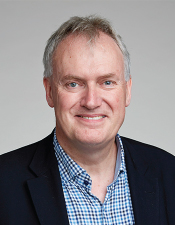
Luke received his PhD in Pharmacology, University of London. Following his PhD, he was a postdoctoral researcher at the Strangeways Research Laboratory in Cambridge (MRC). He is currently a Professor of Biochemistry and Immunology at Trinity College Dublin where he explores the molecular and cellular basis of inflammation and innate immunity, focusing on metabolic reprogramming in immune cells. He is one of Ireland’s leading science figures, in 2016 he was elected a Fellow of the Royal Society for his innovative work on the human immune system. Luke is also a prominent figure on Irish radio and TV, where he engages the general public on scientific topics. He is the author of two bestselling books, including a science book for children.
Gioacchino Natoli
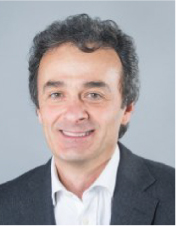
Macrophages are the cell type of interest in Gioacchino’s lab, and his team focuses on how environmental stimuli can affect the organization of macrophages’ genome, resulting in functional heterogeneity among different macrophage populations. Using in vivo and in vitro models, his group is characterizing chromatin modifying enzymes which could represent drug targets for the control of inflammatory responses. Gioacchino received his MD in 1991 from the University of Rome, La Sapienza, where he stayed until 1996 for the residency in Internal Medicine. As post-doc he joined the group of Michael Karin at UCSD. In 2000 he became Principal Investigator at the Institute for Research in Biomedicine in Barcelona and in 2005 moved to the IEO in Milan. In 2016 Gioacchino was appointed as a Professor at the Humanitas University.
Stem Cells
Austin Smith
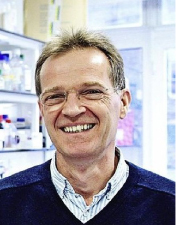
Austin's group investigates how pluripotent stem cells relate to transient pluripotent epiblast cells in the embryo, how they maintain broad developmental potency, and how they prepare for and make cell fate decisions. By comparing pluripotent cells from mouse, human and other mammals he aims to elucidate common principles regulating stem cell biology and species-specific adaptations.
Austin obtained his PhD from University of Edinburgh in1986. He carried out his postdoctoral research at the University of Oxford before joining the University of Edinburgh as group leader. In 1996, he was appointed director of the Centre for Genome Research, which became the Institute for Stem Cell Research under his leadership. In 2006 he moved to Cambridge where he was the founding Director of the Stem Cell Institute and in 2019 he was appointed director of the Living Systems Institute at the University of Exeter.
Jonathan Chubb
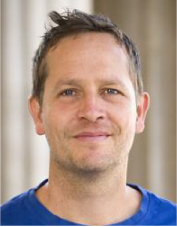
Jonathan’s primary interest are the mechanisms regulating cell identity during development. His group employs a wide range of techniques including imaging and transcriptomics to monitor gene expression dynamics at a single cell level. Jonathan studied at the University of Cambridge and did his PhD at the University College London. Before becoming a group leader at UCL, he collected postdoctoral experience in the labs of Wendy Bickmore at the University of Edinburgh and Robert Singer at the Albert Einstein College of Medicine. From 2005 to 2011 Jonathan was principal investigator at the University of Dundee and in 2012 he returned to University College London as LMCB group leader and now Professor of Quantitative Cell Biology. Throughout his career he received awards such as the Wellcome Trust Senior Fellowship, which he currently holds.
Paulina Latos
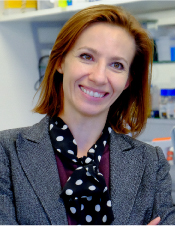
Paulina’s research focuses on trophoblast stem cells, the common stem cell precursors able to generate specialized cell types found in the placenta. Her team uses a combination of genetic manipulations, transcriptomics, proteomics and epigenetic analysis to study the mechanisms regulating cell fate in trophoblast stem cells. After obtaining her PhD in the group of Denise Barlow at CEMM, Paulina worked as a post-doc in Cambridge in Brian Hendrich’s and later in Myriam Hemberger’s lab with the support of the EMBO long-term fellowship and The Next Generation fellowship of the Centre for Trophoblast Research. In 2016 she established her research group at the Medical University of Vienna.
Maria Carolina Florian
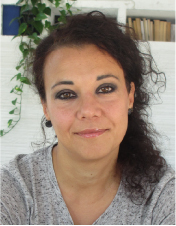
Research in Carolina’s lab revolves around the mechanisms regulating aging in hematopoietic stem cells. Using mouse models, her team investigates the interactions between stem cells and their niche focusing on epigenetic alterations that could be pharmacologically targeted to prevent aging-associated diseases. Carolina got a PhD from the University of Milano and then pursued postdoctoral training at the Institute of Molecular Medicine at Ulm University from 2009 to 2015. She was awarded an Emmy Noether Grant dedicated to outstanding early-career researchers, which supported the establishment of her independent research team on Stem Cell Aging at the Bellvitge Biomedical Research Institute.
Sara Wickström
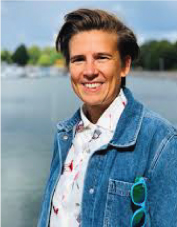
Research in Sara’s lab aims to uncover how single stem cell behaviors are coordinated at the population level, and how population-level dynamics are coupled to tissue architecture. Uncovering these regulatory principles will facilitate the development of stem cell and regenerative therapies and more effective treatments against cancers. Sara studied medicine at the University of Helsinki, Finland and absolved a M.D/PhD. program receiving her MD in 2001 and PhD in 2004. After postdoctoral training with Reinhard Fässler at Max Planck Institute for Biochemistry in Martinsried, she was in 2010 appointed as a Max Planck Research Group Leader at the Max Planck Institute for the Biology of Ageing in Cologne, Germany. Since 2018 she is an Associate Professor at the Helsinki Institute of Life Science where some of her research group focuses more intensely on the stem cells and cellular biology of tissues, while others specialise in mechanobiology, which studies the connection of mechanical interactions with gene expression and consequently with cell behaviour. She was recently elected as member of EMBO.
Nuclear Organization
Susana Gonzalo
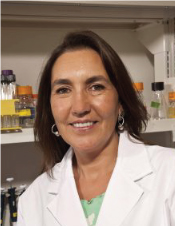
Susana Gonzalo´s research interests are focused on how alterations of nuclear architecture, chromatin structure and genome stability contribute to the processes of aging and cancer. Her studies revealed that the structural nuclear proteins A-type lamins play a key role in the maintenance of telomere structure, length and function as well as mechanisms of DNA double-strand break repair. Specifically, loss of A-type lamins increases the levels of the protease cathepsin L and its entry into the nucleus, which in turn leads to degradation of proteins with important roles in cell cycle regulation-Rb family members and DNA repair with 53BP1. Susana earned her PhD in molecular cell biology from Washington University in St.Louis in 1999 and her Bachelor degree of Science in Biochemistry and Molecular Biology from the Universidad Complutense de Madrid, Spain. She did her postdoctoral training in molecular oncology at the Washington University after her PhD until 2002, when she moved back to Madrid, Spain, to continue her training as postdoctoral fellow in molecular oncology.
Ulrike Kutay
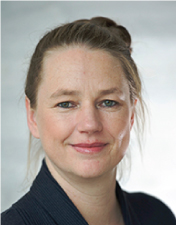
Ulrike performed her PhD thesis in Max-Delbrück-Center, Berlin and at the Harvard Medical School, Boston. Following her postdoctoral studies in ZMBH Heidelberg, she started her own research group in ETH Zürich, where in 2011 she was awarded a full professorship. Ulrike’s laboratory studies the organization, function and dynamics of the human cell nucleus. Investigating different aspects of nuclear biology, including the fundamental biosynthetic function of the nucleus in the assembly of ribosomal subunits, the role of the nuclear envelope in nucleo-cytoplasmic communication and genome organization as well as the dynamics of the nuclear compartment during the cell cycle, aiming to improve understanding of how nuclear dysfunction contributes to human diseases such as ribosomopathies, nuclear envelopathies and cancer.
Colin Stewart
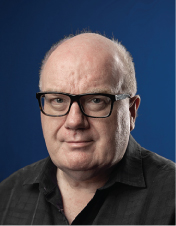
Colin Stewart received his PHD from the University of Oxford where he studied interactions between teratocarcinomas, the forerunners of ES cells, and early mouse embryos. Following postdoctoral work with Rudolf Jaenisch in Hamburg, he was a staff scientist at EMBL in Heidelberg. There he was instrumental in discovering the role of the cytokine LIF in maintaining mouse ES cells. He also initiated his interest in the nuclear lamins and nuclear architecture in development. He continued his studies on the lamins, stem cells and genomic imprinting following relocation to the Roche Institute of Molecular Biology in New Jersey. In 1996 he moved to the ABL research program in Frederick, Maryland and in 1999 was appointed Chief of the Laboratory of Cancer and Developmental Biology at the National Cancer Institute. In the last decade his interests have focused on the functional architecture of the cell’s nucleus in stem cells, regeneration, aging and disease, particularly with regard to how the nuclear functions are integrated with cytoskeletal dynamics in development and disease. Since June 2007 he has been senior principal investigator and assistant director at the Institute of Medical Biology at the Singapore Biopolis.
Fabrizio d'Adda di Fagagna
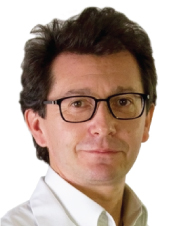
Fabrizio d'Adda di Fagagna is a cell and molecular biologist that studies the involvement of the DNA damage response (DDR) pathways in physiologically-relevant processes such as aging and cancer. Fabrizio studied Biology at the University of Trieste and obtained his Ph.D. in Molecular Genetics at SISSA, the International School for Advanced Studies, in Trieste, Italy, while working at ICGEB (International Centre for Genetic Engineering and Biotechnology) under the guidance of Mauro Giacca and Arturo Falaschi. As a research associate and postdoc in Cambridge, UK, in the group of Steve Jackson at the Gurdon Institute, he discovered the engagement of DDR factors in the maintenance of telomeres and demonstrated that replicative cellular senescence, a form of cell aging, is the outcome of DDR activation caused by the direct recognition of critically short telomeres. He then set up his own research group at IFOM (FIRC Institute of Molecular Oncology) in Milan, Italy, in 2003. Here, he demonstrated that oncogene activation is an intrinsically genotoxic event that, by altering DNA replication, causes DDR activation and cellular senescence establishment. Since then, he continued working on several aspects of cellular senescence. His most exciting recent finding is the discovery of an unanticipated role of non-coding RNAs in the direct activation of the DDR. This discovery fuels most of his present investigative efforts. In 2014, he was awarded a permanent position “for exceptional merits” at the Italian National Research Council (CNR) in Pavia, Italy, where he runs a laboratory. Fabrizio is an EMBO member and received several awards for his work, including the European Association for Cancer Research (EACR) Young Cancer Researcher Award and the EMBO Young Investigator Award. He received two ERC advanced grants.
Wendy Bickmore
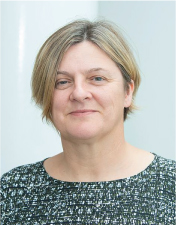
Current research in Wendy Bickmore’s laboratory focuses on how the spatial organization of the nucleus influences genome function in development and disease. Wendy completed her PhD at Edinburgh University and during her postdoctoral training, she became fascinated by the structure and organization of chromosomes in the nucleus. As an independent fellow of the Lister Institute of Preventive Medicine (1991-1996) she went on to show that different human chromosomes have preferred positions in the nucleus, related to their gene content. As an MRC group leader, she then investigated how individual genes are organized and packaged in the nucleus and how they move in the cell cycle and during development. Presently, Wendy is Director of the MRC Human Genetics Unit, part of the MRC Institute of Genetics and Molecular Medicine at the University of Edinburgh. She is an EMBO member and a Fellow of the Royal Society, Royal Society of Edinburgh and of the Academy of Medical Sciences. She is an editor on many journals including PLoS Genetics and Cell and a Past President of the Genetics Society.
Tom Misteli
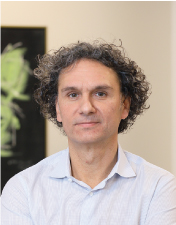
Tom’s laboratory investigates the link between 3D higher genome architecture and its function, aiming to unveil biological mechanisms and apply this knowledge to the development of therapeutic and diagnostic applications in cancer and aging. Tom is an internationally renowned cell biologist who pioneered the development and use of imaging approaches to study genome organization and gene expression in living cells. He obtained his PhD from the University of London and carried out his post-doctoral training at the Cold Spring Harbor Laboratory, NY. Currently he is a Principal Investigator and the Director of the Center for Cancer Research at the National Cancer Institute, NIH. He has received several awards for his work over the years, among them the Gold Medal of the Charles University, the Flemming Award, the NIH Director’s Award, and an NIH Merit Award.
